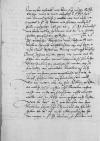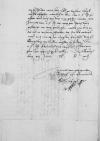Uns ist vor wenig stunden E(wer) F(urstlichen) D(urchlauch)t cf. Albrecht I von Hohenzollern-Ansbach to Ioannes DANTISCUS Königsberg, 1541-06-05, CIDTC IDL 5029⌊schreibencf. Albrecht I von Hohenzollern-Ansbach to Ioannes DANTISCUS Königsberg, 1541-06-05, CIDTC IDL 5029⌋ wurden, / dat(um) Königsberg (Królewiec, Mons Regius, Regiomontium), city in Ducal Prussia, on the mouth of the Pregel (Pregoła) river, capital city of Ducal Prussia; today Kaliningrad in Russia⌊KonigsbergKönigsberg (Królewiec, Mons Regius, Regiomontium), city in Ducal Prussia, on the mouth of the Pregel (Pregoła) river, capital city of Ducal Prussia; today Kaliningrad in Russia⌋ den funften tag dits monts, / woruff wir freuntdinstlicher meinung E(wer) F(urstlichen) D(urchlauch)t nicht wollen vorhalten, / das wir unserm negsten cf. Ioannes DANTISCUS to Albrecht I von Hohenzollern-Ansbach Braunsberg (Braniewo), 1541-06-03, CIDTC IDL 4897⌊schreibencf. Ioannes DANTISCUS to Albrecht I von Hohenzollern-Ansbach Braunsberg (Braniewo), 1541-06-03, CIDTC IDL 4897⌋ nach / bei unser kirchen / diese vorschinne heilige zeit / mit unserm wirdigen Ermland Chapter cathedral chapter based in Frauenburg (Frombork, Varmia)⌊capittelErmland Chapter cathedral chapter based in Frauenburg (Frombork, Varmia)⌋ uns weitleuftig underredt, / und wir so wol, / also unser w(irdiges) capittel E(wer) F(urstlichen) D(urchlauch)t / was den mulbaw des edlen, ernvhesten h(erren) Friedrich von der Ölsnitz (*1490 – †1553), at least in 1539-1550 grand marshal of duke Albrecht von Hohenzollern; captain (Hauptmann) of Hohenstein (HARTMANN 1525-1550)⌊Friderichen von der OlsnitzFriedrich von der Ölsnitz (*1490 – †1553), at least in 1539-1550 grand marshal of duke Albrecht von Hohenzollern; captain (Hauptmann) of Hohenstein (HARTMANN 1525-1550)⌋, E(wer) F(urstlichen) D(urchlauch)t rath und obermarschalh, angehet, / gerne zu superinscribed⌈zuzu superinscribed⌉ freuntlichem wolgefallen / unnd dinstlichem willen weren gewest, / derwegen auch under uns die sache mit sonderm vleis bewogenn. / Wir haben aber befunden, / das wir samptlich unserm freuntlichen und dinstlichem gemut, / das wir und unser w(irdiges) Ermland Chapter cathedral chapter based in Frauenburg (Frombork, Varmia)⌊capittelErmland Chapter cathedral chapter based in Frauenburg (Frombork, Varmia)⌋ zu E(wer) F(urstlichen) D(urchlauch)t tragen, / in diesem falh / nicht haben mugen nachkommen / aus beschwerlichen, wichtigen ursachen, / die wir E(wer) F(urstlichen) D(urchlauch)t entlich in kortzen tagen schrifftlich anzuzeigen vorgenommen / und under uns entschlossen, / aus welchen E(wer) F(urstliche) D(urchlauch)t wirt haben zuermessen und grundtlich zuvorstehen, / das wir solchen angefangenen baw, / so weit der sich uff  GStA PK, HBA, C1 No 765, 2 unnumbered das unsere erstreckt, / mit keim fug mugen lassen bleiben. / Were es umer muglich (: so fast hab wir dornach gesucht :), wolten wir und unser w(irdiges) Ermland Chapter cathedral chapter based in Frauenburg (Frombork, Varmia)⌊capittelErmland Chapter cathedral chapter based in Frauenburg (Frombork, Varmia)⌋ E(wer) F(urstlichen) D(urchlauch)t begeren und furdern williglich haben nachgesetzt / also die, / die E(wer) F(urstlichen) D(urchlauch)t freuntlich und bereit willig zudienen / und die / uns zuvorhalten / gentzlich sein geflissen. /
GStA PK, HBA, C1 No 765, 2 unnumbered das unsere erstreckt, / mit keim fug mugen lassen bleiben. / Were es umer muglich (: so fast hab wir dornach gesucht :), wolten wir und unser w(irdiges) Ermland Chapter cathedral chapter based in Frauenburg (Frombork, Varmia)⌊capittelErmland Chapter cathedral chapter based in Frauenburg (Frombork, Varmia)⌋ E(wer) F(urstlichen) D(urchlauch)t begeren und furdern williglich haben nachgesetzt / also die, / die E(wer) F(urstlichen) D(urchlauch)t freuntlich und bereit willig zudienen / und die / uns zuvorhalten / gentzlich sein geflissen. /
In E(wer) F(urstlichen) D(urchlauch)t underthan Bartholomeus Vogt (Bartholomeus Voigt, Bartholomeus Voit) ⌊Bartholme VogtsBartholomeus Vogt (Bartholomeus Voigt, Bartholomeus Voit) ⌋ sache / wolle wir, / unserm spruche unschedlich, / ein tag ansetzen / in unser stad Rössel (Reszel), town in Ermland (Warmia), 55 km NE of Allenstein (Olsztyn), on the border with Ducal Prussia⌊RessellRössel (Reszel), town in Ermland (Warmia), 55 km NE of Allenstein (Olsztyn), on the border with Ducal Prussia⌋ den montag nach negstkunftig sanct Johans tag, den XXVII dits monts, / und befelhen den unsern, / dieweil niemants zu sunlichen underhandlungen genotiget sol werden, / das sie freywillig, / von gemeltem Bartolme ersucht, / mugen anhoren, / was vorgebracht, / und was in doruff zuthun ader an zunemen sein will. / Mit den andern aber, / die zum Elbing (Elbląg), city in northern Poland, Pomerania, on the Vistula Lagoon, one of the three Great Prussian Cities (beside Gdańsk (Danzig) and Thorn (Toruń)) which had representatives in the Prussian Council; member of the Hanseatic League⌊ElbingElbing (Elbląg), city in northern Poland, Pomerania, on the Vistula Lagoon, one of the three Great Prussian Cities (beside Gdańsk (Danzig) and Thorn (Toruń)) which had representatives in the Prussian Council; member of the Hanseatic League⌋ gesessen, / die welche sich so nahent also Bartholomeus Vogt (Bartholomeus Voigt, Bartholomeus Voit) ⌊BartolmeBartholomeus Vogt (Bartholomeus Voigt, Bartholomeus Voit) ⌋ rechent, / wisse wir nichts vorzunehmen. / Nichts weniger wollen wir in solchs unangezeigt nicht lassen. /
Was bei Charles V of Habsburg (*1500 – †1558), ruler of the Burgundian territories (1506-1555), King of Spain as Charles I (1516-1556), King of Naples and Sicily, King of the Romans (1519-1530), Holy Roman Emperor of the German Nation (elected 1519, crowned 1530, abdicated 1556); son of Philip I the Handsome and Joanna the Mad of Castile⌊key(serliche)r m(aieste)tCharles V of Habsburg (*1500 – †1558), ruler of the Burgundian territories (1506-1555), King of Spain as Charles I (1516-1556), King of Naples and Sicily, King of the Romans (1519-1530), Holy Roman Emperor of the German Nation (elected 1519, crowned 1530, abdicated 1556); son of Philip I the Handsome and Joanna the Mad of Castile⌋ / groskantzler, den hern Nicolas Perrenot de Granvelle (*1484 – †1550), doctor of both canon and civil law, one of the most trusted advisors of Emperor Charles V, in 1519 entered the service of Charles V, in 1521 took part in the Habsburg-French negotiations in Calais, in 1529 in peace negotiations with the Roman Curia and the Italian states, and later, in 1538, in the conference of Nice between Charles V and Francis I; prominent official and advisor of Charles V and of Margaret of Austria in the administration of the County of Burgundy and of the Habsburg Netherlands, collaborator of Chancellor Gattinara, 1530 secretary of State for German and Netherlandish affairs and Chancellor of the Kingdom of Sicily and Naples (he replaced Gattinara after his death in the position of Grand Chancellor, although not using the title); imperial envoy to France (several times up to 1528) (CE, vol. 3, p. 68-70; DURME 1964; ANTONY 2006)⌊Nicolaum Pernot zu GranvelaNicolas Perrenot de Granvelle (*1484 – †1550), doctor of both canon and civil law, one of the most trusted advisors of Emperor Charles V, in 1519 entered the service of Charles V, in 1521 took part in the Habsburg-French negotiations in Calais, in 1529 in peace negotiations with the Roman Curia and the Italian states, and later, in 1538, in the conference of Nice between Charles V and Francis I; prominent official and advisor of Charles V and of Margaret of Austria in the administration of the County of Burgundy and of the Habsburg Netherlands, collaborator of Chancellor Gattinara, 1530 secretary of State for German and Netherlandish affairs and Chancellor of the Kingdom of Sicily and Naples (he replaced Gattinara after his death in the position of Grand Chancellor, although not using the title); imperial envoy to France (several times up to 1528) (CE, vol. 3, p. 68-70; DURME 1964; ANTONY 2006)⌋, / der hendel halben, die Sigismund I Jagiellon (Zygmunt I) (*1467 – †1548), King of Poland and Grand Duke of Lithuania (1506-1548); Duke of Głogów (Glogau) (1499-1506), Duke of Opava (1501-1506), Governor of Silesia (1504-1506); son of King Kazimierz IV Jagiellon and Elisabeth of Austria⌊ko(niglich)e m(aieste)tSigismund I Jagiellon (Zygmunt I) (*1467 – †1548), King of Poland and Grand Duke of Lithuania (1506-1548); Duke of Głogów (Glogau) (1499-1506), Duke of Opava (1501-1506), Governor of Silesia (1504-1506); son of King Kazimierz IV Jagiellon and Elisabeth of Austria⌋, unser allergnedigister her, von wegen E(wer) F(urstlichen) D(urchlauch)t beruren, / zu furdern und  GStA PK, HBA, C1 No 765, 3 unnumbered anzuhalten wirt sein, / sal an unserm vleiss nichts abgehen, / nemlich in dem, / das E(wer) F(urstliche) D(urchlauch)t zu ehren und nutz von uns mag gethan werden. / Wirt imants von E(wer) F(urstlichen) D(urchlauch)t des wegs gen Regensburg (Ratisbona), city in southeastern Germany, Bavaria, on the Danube river⌊RegensburgRegensburg (Ratisbona), city in southeastern Germany, Bavaria, on the Danube river⌋ gefertigt, / an uns gelangen, / wolle wir uns an die ort in unserm schreiben, / dis handels notturft nach, / und wie es im jungsten zwuschen uns zu Königsberg (Królewiec, Mons Regius, Regiomontium), city in Ducal Prussia, on the mouth of the Pregel (Pregoła) river, capital city of Ducal Prussia; today Kaliningrad in Russia⌊KonigsbergKönigsberg (Królewiec, Mons Regius, Regiomontium), city in Ducal Prussia, on the mouth of the Pregel (Pregoła) river, capital city of Ducal Prussia; today Kaliningrad in Russia⌋ vorlassen, / wissen zuhalten, / dan E(wer) F(urstliche) D(urchlauch)t freuntlich und wirglich zudienenn sein wir begirig und willig. /
GStA PK, HBA, C1 No 765, 3 unnumbered anzuhalten wirt sein, / sal an unserm vleiss nichts abgehen, / nemlich in dem, / das E(wer) F(urstliche) D(urchlauch)t zu ehren und nutz von uns mag gethan werden. / Wirt imants von E(wer) F(urstlichen) D(urchlauch)t des wegs gen Regensburg (Ratisbona), city in southeastern Germany, Bavaria, on the Danube river⌊RegensburgRegensburg (Ratisbona), city in southeastern Germany, Bavaria, on the Danube river⌋ gefertigt, / an uns gelangen, / wolle wir uns an die ort in unserm schreiben, / dis handels notturft nach, / und wie es im jungsten zwuschen uns zu Königsberg (Królewiec, Mons Regius, Regiomontium), city in Ducal Prussia, on the mouth of the Pregel (Pregoła) river, capital city of Ducal Prussia; today Kaliningrad in Russia⌊KonigsbergKönigsberg (Królewiec, Mons Regius, Regiomontium), city in Ducal Prussia, on the mouth of the Pregel (Pregoła) river, capital city of Ducal Prussia; today Kaliningrad in Russia⌋ vorlassen, / wissen zuhalten, / dan E(wer) F(urstliche) D(urchlauch)t freuntlich und wirglich zudienenn sein wir begirig und willig. /
 GStA PK, HBA, C1 No 765, 4 unnumbered
GStA PK, HBA, C1 No 765, 4 unnumbered
 GStA PK, HBA, C1 No 765, 1 unnumbered
GStA PK, HBA, C1 No 765, 1 unnumbered  GStA PK, HBA, C1 No 765, 2 unnumbered das unsere erstreckt, / mit keim fug mugen lassen bleiben. / Were es umer muglich (: so fast hab wir dornach gesucht :), wolten wir und unser w(irdiges)
GStA PK, HBA, C1 No 765, 2 unnumbered das unsere erstreckt, / mit keim fug mugen lassen bleiben. / Were es umer muglich (: so fast hab wir dornach gesucht :), wolten wir und unser w(irdiges)  GStA PK, HBA, C1 No 765, 3 unnumbered anzuhalten wirt sein, / sal an unserm vleiss nichts abgehen, / nemlich in dem, / das E(wer) F(urstliche) D(urchlauch)t zu ehren und nutz von uns mag gethan werden. / Wirt imants von E(wer) F(urstlichen) D(urchlauch)t des wegs gen
GStA PK, HBA, C1 No 765, 3 unnumbered anzuhalten wirt sein, / sal an unserm vleiss nichts abgehen, / nemlich in dem, / das E(wer) F(urstliche) D(urchlauch)t zu ehren und nutz von uns mag gethan werden. / Wirt imants von E(wer) F(urstlichen) D(urchlauch)t des wegs gen 


